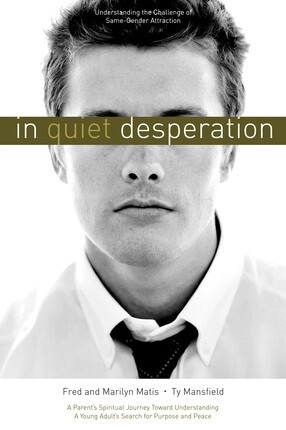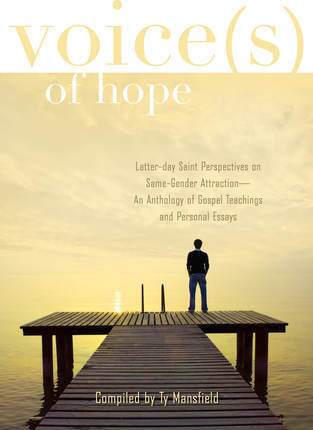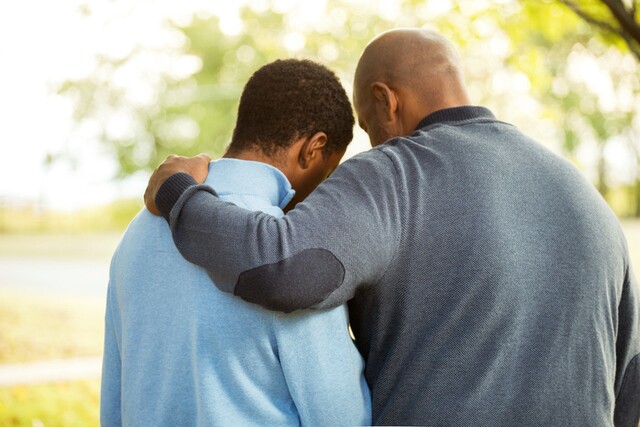The following is an excerpt from Voices of Hope: Latter-day Saint Perspectives on Same-Gender Attraction, taken from the chapter “Perspectives for Parents.” Click here to learn more.
Listening
As we look to our child, we may find it possible to identify some ways in which we have unwittingly made life more difficult for our child; and then we may consider offering a detailed apology. This is self-care as well as child care because our spirit knows when we have not measured up in a relationship; to heal ourselves, we have to come clean in the relationship. During this apology, we will not mention the child’s failings, only our own. We will humbly ask forgiveness and ask how we can be more helpful. We will listen undefensively, as dispassionately as we can. Healing communication can then begin. Then, in addition to much listening, we may be able to share with our child, as time goes on, some points of view that can reassure both our child and us.
Avoiding Shame and Guilt
Our child will likely be suffering from shame and feelings of unworthiness, even if he has not chosen to express his same-gender attraction sexually. He may have felt directly or indirectly the negativity, sometimes amounting to hatred and vitriol, being poured out, even by some members of the Church, on people dealing with same-gender attraction. His feelings of shame will interfere with his ability to draw close to the Lord for comfort.
Following are responses that two people have had as they have confronted both shame and guilt over their same-gender feelings and the issue of sex. A young LDS woman in her 30's who has just begun coming to terms, after a 15-year struggle, with her feelings of attraction for other women, and is wondering what this means for her, wrote me the following about her perception that, at their inception, same-gender feelings do not seem intrinsically sexual.
“It’s not about sex. Other people think that those who might be/are gay are struggling with immoral thoughts/feelings and behaviors. But what you will hear across the board is that the first feeling is that ‘I am different.’ As other teenagers or young adults start to explore with giddiness their crushes and dreamy thoughts of an ideal future, those with same-gender attraction start to try to figure out what is wrong with them. I think THIS is the battlefront. “They begin to feel shame over their nonsexualized attraction to the same gender, where heterosexuals are encouraged in that attraction, understood, given boundaries to work within, etc. Ultimately, heterosexuals can find legitimate physical/sexual expression for that attraction, but many same-gender-attracted people freeze in that shame—never drifting to immoral thoughts/feelings/behavior, but having no route, or reroute, for that part of themselves—and begin to internalize this struggle.”
Another LDS young man who deals with this challenge wrote similarly:
“The shame is a huge problem. . . . I had similar feelings of being ‘different’ when I was younger, and while I occasionally fantasized about being physically close with other boys, I don’t recall it ever feeling sexual until well into high school—and even then I was so afraid of those feelings that I never allowed myself to acknowledge them. More often than not, I just wanted to feel close to other guys, or I would allow myself to overfocus on qualities in them I felt I lacked, and wanted, in myself. “I remember once wanting to give my best friend a hug when I saw him, and he looked at me funny and asked if I was gay. That was in fourth grade, I think. All I knew about ‘gay’ was that it was bad, and the shame I felt in that moment led me to tenaciously avoid any behaviors that might be perceived that way. I disowned a lot of parts of my personality, and it’s only been in my adulthood that I’ve been learning to reclaim, reintegrate those parts, and learn to love men in the deep and intimate and healthy ways I only ever wanted anyway.”
Caring for your child would include helping him to let go of shame for the feelings themselves and reassuring him of the Lord’s love. Many people who experience same-gender attraction find that, despite the fact that they are dealing with a set of deeply disconcerting feelings, they can exist in a loving relationship with the Lord in the same system of faith, repentance, and having the Holy Ghost that anyone else can. In this way, they are able to embrace a sense of worthiness that allows them to move forward spiritually as they manage these feelings within the bounds the Lord has set.
Elder Holland wrote on making the distinction between feelings and behavior: “While same-gender attraction is real, there must be no physical [sexual or romantic] expression of this attraction. The desire for physical gratification does not authorize immorality by anyone. Such feelings can be powerful, but they are never so strong as to deprive anyone of the freedom to choose worthy conduct. In saying this, let me make it clear that attractions alone, troublesome as they may be, do not make one unworthy.”
Avoid Negative Labeling
People tend to behave according to the way they see themselves. Help him to take care with the labels he puts on himself. Lift your child’s sights to a vision of who he really is. Elder Dallin H. Oaks offers this counsel to a parent about what he might say to his child:
“You’re my son. You will always be my son, and I’ll always be there to help you. . . . “Homosexuality . . . is not a noun that describes a condition. It’s an adjective that describes feelings or behavior. I encourage you, as you struggle with these challenges, not to think of yourself as a ‘something’ or ‘another,’ except that you’re a member of The Church of Jesus Christ of Latter-day Saints and you’re my son, and that you’re struggling with challenges. . . . “You’ve described a particular kind of challenge that is very vexing. It is common in our society and it has also become politicized. But it’s only one of a host of challenges men and women have to struggle with, and I just encourage you to seek the help of the Savior to resist temptation and to refrain from behavior that would cause you to have to repent or to have your Church membership called into question.”
Shaping a Life
As people dealing with same-gender attraction look at traditional lifestyles, they may not see where they fit in. One young man wrote me: “All of the talks at BYU on dating and marriage, including some in which we were told that if we weren’t dating ‘X’ number of times per week we weren’t magnifying our priesthood, left me feeling especially depressed, broken, and like I was failing God and everyone else around me. It wasn’t until I had a very powerful spiritual witness—in association with Isaiah 56:3–4, actually—that all I needed to do was my best to nurture my relationship with the Lord and to cultivate and follow the Spirit in my life (and whether I married in this life or the next, I was completely accepted of the Lord) that I felt so much of that burden of shame and guilt and depression and failure lift. The love I felt was overwhelming and taught me what my central focus should be. Prior to that, the cultural box I was being shoved into was spiritually and emotionally suffocating.”
Another young man, who chose to serve a mission even while dealing with the challenge of same-gender attraction, describes how he had been mentally and emotionally stuck in choosing the gospel way over the world’s way until he found that he didn’t have to live a traditional life and that, indeed, stereotypes can be ignored:
“I understood, finally, that I was an individual on my own path and that it was impossible to know where that would take me. I did have to make choices along the way, but I wasn’t limited by those stereotypes in my head. And the only thing I had to commit to was the gospel of Jesus Christ. The important distinction was between LDS culture, which isn’t necessarily true, and the fulness of the gospel, which is. When I realized that my path might not look like everyone else’s and that it was really just between the Lord and me, I felt a new confidence. I handed that map over to the Savior and let him navigate—I jumped into the driver’s seat. . . . If we truly trust the Lord, we don’t need to fear the unknown vistas that await us. We can listen to the Spirit and the compass of our hearts and look forward to that day . . . when we realize we have happened onto an answer and that it was the Lord who brought us there. But until then, there’s no reason we shouldn’t roll down the windows and breathe deeply, even if we’re not sure exactly where we are. It’s okay, the Lord does.”
Setting Boundaries
At some point parents are faced with situations in which they wonder what boundary lines might be appropriate because their love for their child versus their sense of right and wrong can create conflict in their minds. Such situations might include whether to attend a marriage or commitment ceremony, or what role a potential partner might play within the family. Elder Oaks was asked: “At what point does showing that love cross the line into inadvertently endorsing behavior? If the son says, ‘Well, if you love me, can I bring my partner to our home to visit? Can we come for holidays?’ How do you balance that against, for example, concern for other children in the home?”
Can a parent’s love cross a line and inadvertently endorse homosexual practice? Elder Oaks responded: “That’s a decision that needs to be made individually by the person responsible, calling upon the Lord for inspiration. I can imagine that in most circumstances the parents would say, ‘Please don’t do that. Don’t put us into that position.’ Surely if there are children in the home who would be influenced by this example, the answer would likely be that. There would also be other factors that would make that the likely answer. . . . There are so many different circumstances, it’s impossible to give one answer that fits all.”
Elder Wickman emphasizes a parent’s need to avoid the pitfall of defending a child’s homosexual lifestyle: “I think it’s important as a parent to avoid a potential trap arising out of one’s anguish over this situation. I refer to a shift from defending the Lord’s way to defending the errant child’s lifestyle, both with him and with others. It really is true the Lord’s way is to love the sinner while condemning the sin. That is to say, we continue to open our homes and our hearts and our arms to our children, but that need not be with approval of their lifestyle. Neither does it mean we need to be constantly telling them that their lifestyle is inappropriate. An even bigger error is now to become defensive of the child because that neither helps the child nor helps the parent. That course of action, which experience teaches, is almost certainly to lead both away from the Lord’s way.”
One mother remarks that she has said to her son: “‘I love you and respect your feelings, and I know you will respect mine. Because you were reared in the Church, you know what my standards are.’ He is fine with that because he prides himself on being an honest person.”
Elder Oaks mentioned that different circumstances may require different responses. After fasting and prayer, one set of parents in a home where there were no younger children chose to let the child and his long-term partner make the decision as to whether they would share a bedroom in the family home. The key seems to be Elder Oaks’s statement: “That’s a decision that needs to be made individually by the person responsible, calling upon the Lord for inspiration.”
Click here to read the companion piece, "Our Story: Living with Same-sex Attraction" by Ty and Danielle Mansfield.
The lead image above is from Getty Images. It is being used for illustrative purposes only and does not reflect the opinions or feelings of the models found therein.
Here are more valuable resources on same-sex attraction:
Voices of Hope: Latter-day Perspectives on Same-Gender Attraction
An invaluable resource on the topic of same-gender attraction, this unique volume includes six plenary chapters features notable authors and gospel scholars: Brad Wilcox, M. Catherine Thomas, Camille Fronk Olson, Wendy Ulrich, Robert L. Millet, and Michael Goodman.
In addition, each chapter includes personal essays or first-person stories of faith and commitment from Latter-day Saints who have dealt with same-gender attraction.
A Reason for Faith: Homosexuality and the Gospel
A Reason for Faith was written to do just as the title implies, provide reasons for faith by offering faithful answers to sincere questions. Before the Internet, historical and doctrinal questions not addressed in LDS Church curriculum were mostly found in the scholarly articles of academic journals. This is no longer the case. These topics are now widely debated and discussed online and in other forums. And when members of the LDS Church come across information that is unfamiliar, they may feel surprise, fear, betrayal, or even anger. Laura Harris Hales has assembled a group of respected LDS scholars to offer help in A Reason for Faith: Navigating LDS Doctrine and Church History. Together these authors have spent an average of 25 years researching these topics. Their depth of knowledge and faith enables them to share reliable details, perspective, and context to both LDS doctrine and Church history.
In Quiet Desperation: Understanding the Challenge of Same-Gender Attraction
Most likely, someone you know is living a life of quiet desperation, struggling with feelings of same-gender attraction. In an effort to help Latter-day Saints understand and reach out to those who suffer from this difficulty, Fred and Marilyn Matis discuss how they've dealt with the knowledge of their son Stuart's challenge with same-gender attraction, and how parents and others can reach out with love. In addition, Ty Mansfield discusses his own challenge and how he continues to go forward with faith in the gospel of Jesus Christ. "The Lord promised that he will change our hearts, but he didn't say when," writes Mansfield. "He never promised it would happen in mortality. He only said it would happen."




